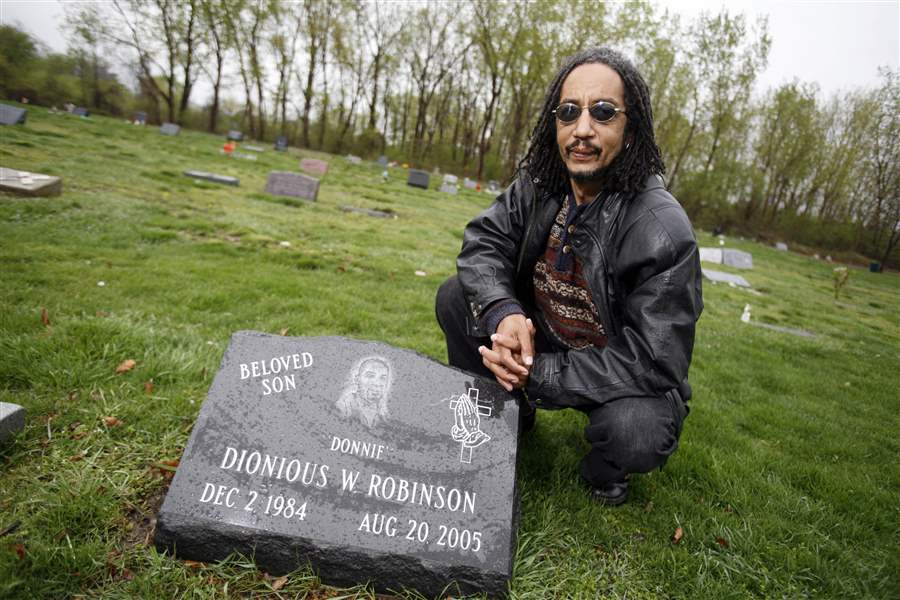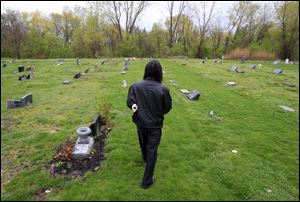
Killers jailed too close to graves, group says
4/20/2010
'It seems to be more punishment to the victim to have the perpetrator of this crime housed in Toledo,' said Les Robinson. He hopes to raise awareness of the issue during National Crime Victims Rights Week, which begins Monday.
The Blade/Andy Morrison
Buy This Image

Les Robinson, leader of Parents of Murdered Children in Toledo, says he was able to find peace at his son's grave at Forest Cemetery until he learned the man who shot his son is jailed a mile away.
In the years since his son was killed with a single shot through the heart, Les Robinson has been able to find some peace at Dionious Robinson's grave site tucked in the back of Forest Cemetery.
That is until a couple years ago, when he learned that the man convicted of pulling the trigger was located only about a mile away, housed in the Toledo Correctional Institution.
It was a discovery made by a quick search via the Internet that ripped away the feelings of comfort Mr. Robinson once felt during his graveside visits. Today, Mr. Robinson and other members of the local chapter of Parents of Murdered Children hope to raise awareness of the issue during a news conference.
Recognizing the first day of National Crime Victims Rights Week, the group will be joined by Lucas County Prosecutor Julia Bates in a call on state officials to take violent offenders out of the prisons in the communities where they committed their crimes. Mr. Robinson said it's the least that can be done for those people who live every day with the pain of victimization.
"When I go out to Forest Cemetery, where my son is at, I can see the prison where this man is at," he said of Elmer Winters, who was sentenced in 2006 to 12 years in prison after entering a plea to involuntary manslaughter with a gun specification.
"I just don't think it's fair. It seems to be more punishment to the victim to have the perpetrator of this crime housed in Toledo," Mr. Robinson added. "There are [28 men's] prisons in Ohio, [an offender] can be housed at … one [other] than where the crime took place."
Opened in 2000, the Toledo Correctional Institution houses about 1,160 inmates. According to the Ohio Department of Rehabilitation and Correction, inmates are assigned a "parent institution" based on several factors, including the security level of the prison and the classification of the prisoner.

'It seems to be more punishment to the victim to have the perpetrator of this crime housed in Toledo,' said Les Robinson. He hopes to raise awareness of the issue during National Crime Victims Rights Week, which begins Monday.
The prison system has a five-tier security classification system, which uses rankings from 1 to 5. A Level 5 identifies the most dangerous offenders who need the closest supervision. Toledo Correctional is a Level 3 closed-security facility and is one of only six Level 3 facilities in the state.
Inmates are reviewed annually and security classifications are created based on things such as disciplinary records, mental-health issues, prior criminal histories, and the crime and the sentence. The prison system also takes into consideration where the inmate is from so that family members have access, which has been found to be important for those inmates who will return to the community when released.
Julie Walburn, a department spokesman, said the department must manage more than 51,000 inmates annually and is often limited in where they can be placed. She said the department must consider a multitude of issues and that family access is accounted for after many other factors.
"We feel for the victims, we understand that they have pain. But it would be impossible for us to track the residence of more than 51,000 inmates and more than 51,000 victims, especially with the limited number of [high-security] prisons," Ms. Walburn said.
Working with the prosecutor's office, members of Parents of Murdered Children hope to spread the message to state officials that the way things are now done in effect "revictimizes the victims," said Russ Simpson, an active member of the group.
"Any victim whose offender is incarcerated here, any time you go down I-280, you get that flashback. The [person] who killed my loved one is sitting right there, having three square meals and all the amenities, when here we are trying to pick up the pieces," Mr. Simpson said. "Why should they be housed right in our backyard? We're trying to make people, the justice officials, aware of the revictimization of victims."
Mr. Simpson said his son's convicted killer is housed miles away in a prison in Chillicothe, Ohio. However, he understands the pain that not only families of murder victims feel but those who have experienced any sort of violent crime.
The issue of inmates being housed in local institutions has been a concern for Ray Fisher ever since learning his daughter's killer was incarcerated nearby. Mr. Fisher, whose daughter, Misty, was murdered during a robbery of a local KFC, said he continues to pursue having convicted murdered Jamie Madrigal moved from the local prison.
Incarcerated in 2007 for a term of 126 years to life, Madrigal was transferred to the prison on East Central Avenue after spending nearly a decade on death row. The move means that Madrigal now lives behind walls visible from where Mr. Fisher works at the Toledo Jeep Assembly complex.
Mr. Fisher said Friday that he supports the group's efforts and plans to attend today's news conference.
Areti Tsavousis, director of the prosecutor's office's Victim Assistance Division, said that the theme of this year's victim rights week is "victim's rights, fairness, dignity, and respect." It is with this theme in mind that the effort was organized to call on state officials to send those offenders who commit crimes in Toledo to prison somewhere else.
She said victim advocates tell families about the possibility that a offender could be incarcerated locally and suggest they write a letter to proactively address the issue of where an offender is housed.
"We want to make sure that all victims know about and can exercise their rights," she said. "I think it's very difficult if you're a victim to have the offender housed in your backyard when you know you can't see your loved one again."
Contact Erica Blake at:
eblake@theblade.com
or 419-213-2134.